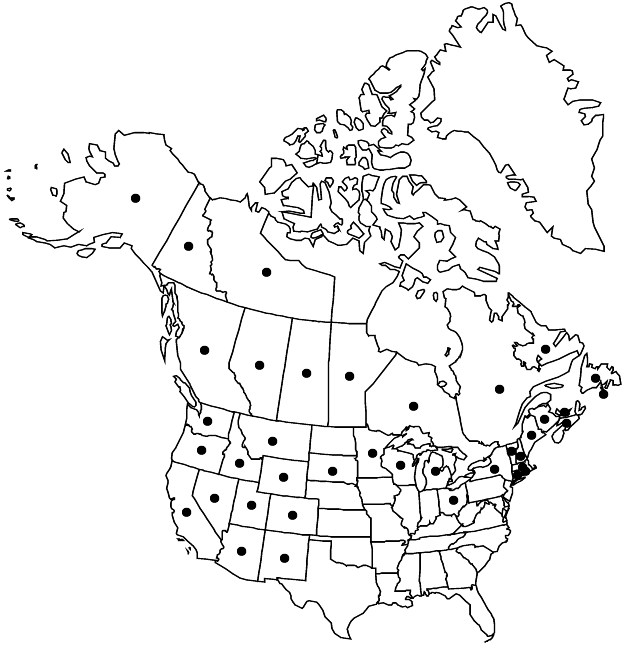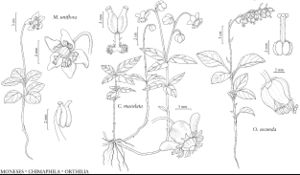Difference between revisions of "Moneses uniflora"
Manual, 273. 1848,.
FNA>Volume Importer |
FNA>Volume Importer |
||
| Line 13: | Line 13: | ||
|name=Moneses uniflora subsp. reticulata | |name=Moneses uniflora subsp. reticulata | ||
|authority=(Nuttall) Calder & Roy L. Taylor | |authority=(Nuttall) Calder & Roy L. Taylor | ||
| − | }}{{Treatment/ID/Synonym | + | }} {{Treatment/ID/Synonym |
|name=Moneses uniflora var. reticulata | |name=Moneses uniflora var. reticulata | ||
|authority=(Nuttall) S. F. Blake | |authority=(Nuttall) S. F. Blake | ||
| Line 31: | Line 31: | ||
|elevation=10-3500 m | |elevation=10-3500 m | ||
|distribution=St. Pierre and Miquelon;Alta.;B.C.;Man.;N.B.;Nfld. and Labr.;N.W.T.;N.S.;Ont.;P.E.I.;Que.;Sask.;Yukon;Alaska;Ariz.;Calif.;Colo.;Conn.;Idaho;Maine;Mass.;Mich.;Minn.;Mont.;Nev.;N.H.;N.Mex.;N.Y.;Ohio;Oreg.;R.I.;S.Dak.;Utah;Vt.;Wash.;Wis.;Wyo.;Eurasia. | |distribution=St. Pierre and Miquelon;Alta.;B.C.;Man.;N.B.;Nfld. and Labr.;N.W.T.;N.S.;Ont.;P.E.I.;Que.;Sask.;Yukon;Alaska;Ariz.;Calif.;Colo.;Conn.;Idaho;Maine;Mass.;Mich.;Minn.;Mont.;Nev.;N.H.;N.Mex.;N.Y.;Ohio;Oreg.;R.I.;S.Dak.;Utah;Vt.;Wash.;Wis.;Wyo.;Eurasia. | ||
| − | |discussion=<p>Most chromosome counts are 2n = 26; there are reports of 2n = 22, 24, and 32 (Á. Löve and D. Löve 1975b). The veracity of the latter reports has not been confirmed. Moneses uniflora has been used by different Native American tribes as a dermatological aid, cold remedy, throat aid, and analgesic (D. E. Moerman 1998).</p> | + | |discussion=<p>Most chromosome counts are 2n = 26; there are reports of 2n = 22, 24, and 32 (Á. Löve and D. Löve 1975b). The veracity of the latter reports has not been confirmed. <i>Moneses uniflora</i> has been used by different Native American tribes as a dermatological aid, cold remedy, throat aid, and analgesic (D. E. Moerman 1998).</p> |
|tables= | |tables= | ||
|references= | |references= | ||
| Line 55: | Line 55: | ||
|publication year= | |publication year= | ||
|special status= | |special status= | ||
| − | |source xml=https://jpend@bitbucket.org/aafc-mbb/fna-data-curation.git/src/ | + | |source xml=https://jpend@bitbucket.org/aafc-mbb/fna-data-curation.git/src/8f726806613d60c220dc4493de13607dd3150896/coarse_grained_fna_xml/V8/V8_726.xml |
|subfamily=Ericaceae subfam. Monotropoideae | |subfamily=Ericaceae subfam. Monotropoideae | ||
|genus=Moneses | |genus=Moneses | ||
Revision as of 18:08, 18 September 2019
Plants arising from horizontal roots, 0.3–3 dm. Leaves: petiole 5–20(–30) mm, channeled adaxially, glabrous; blade dull and light green abaxially, shiny and green adaxially, 6–22 × 5–20 mm, base rounded to obtuse, apex obtuse to rounded. Inflorescences: peduncle 3–15 cm; peduncular bracts absent or 1(–2), oblanceolate to elliptic or orbiculate, (2.5–)4–4.5 × (2–)2.7–3.4 mm, membranous, margins entire or obscurely erose-denticulate. Flowers: calyx lobes spreading or reflexed in fruit, green or green with margins whitish green, 2–2.5 × 1.5–2 mm, margins erose-denticulate, apex rounded to obtuse; petals ovate to broadly ovate, 8–12 × 4–8 mm, margins minutely denticulate; stamens 4–8 mm; filament base 0.4–0.8 mm wide; anthers 2.2–2.5 mm, thecae whitish yellow to tan or light brown, tubules golden brown to brown, 0.4–0.8 mm, abruptly narrowed from thecae, lateral walls not touching, pores 0.2–0.4 × 0.2–0.4 mm; ovary smooth; style 2–5 mm; stigma 1.4–3.5 mm wide, lobes erect. Capsules subglobose, 4–8 × 5–9 mm. 2n = 22, 24, 26, 32.
Phenology: Flowering Jun–Aug.
Habitat: Moist forests, bogs
Elevation: 10-3500 m
Distribution

St. Pierre and Miquelon, Alta., B.C., Man., N.B., Nfld. and Labr., N.W.T., N.S., Ont., P.E.I., Que., Sask., Yukon, Alaska, Ariz., Calif., Colo., Conn., Idaho, Maine, Mass., Mich., Minn., Mont., Nev., N.H., N.Mex., N.Y., Ohio, Oreg., R.I., S.Dak., Utah, Vt., Wash., Wis., Wyo., Eurasia.
Discussion
Most chromosome counts are 2n = 26; there are reports of 2n = 22, 24, and 32 (Á. Löve and D. Löve 1975b). The veracity of the latter reports has not been confirmed. Moneses uniflora has been used by different Native American tribes as a dermatological aid, cold remedy, throat aid, and analgesic (D. E. Moerman 1998).
Selected References
None.
